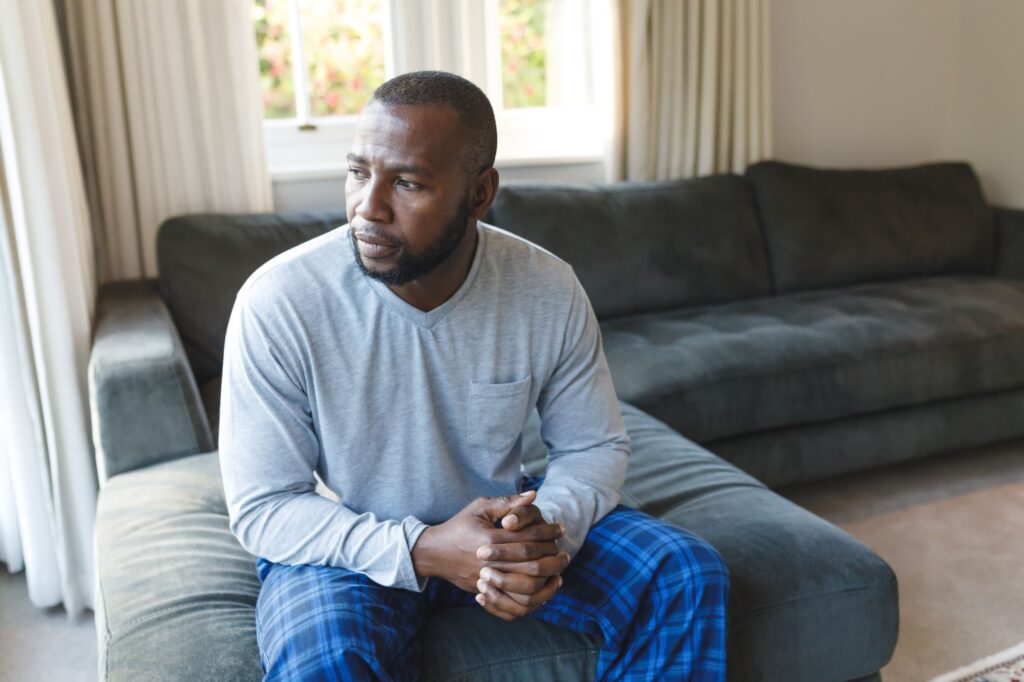The theme of 2017 Mental Health Awareness Week is ‘surviving or thriving?’ In the context of men’s mental health in the UK in 2017 it feels like a perfect question to pose. Data – and there is lots of it – points to only one conclusion: many men are, at best, just about surviving and we are creating a nation of unhappy men.
Creating a nation of unhappy men

Research published at the end of last year highlighted that men are 3-times more likely than women to take their own lives in the UK. Suicide remains the single biggest killer of British males under the age of 45. Furthermore a longstanding inability of men to openly discuss their problems was highlighted as a significant contributing factor.
The study shed light on some of the underlying causes of what amounts to a burgeoning epidemic of unhappy men. In particular the role of traditional gender stereotypes remains significant.
Even as recently as 25 years ago, gender roles remained relatively clearly divided. The male would be the main breadwinner and the financial strength of a family. Along with it came other masculine stereotypes like status and standing in the community being determined by employment and income. Women would be the home-makers and child-bearers with all the limitations of opportunity that entailed.
Female gender roles reshaped
Rightly feminism has reshaped society in to one where women are encouraged and able to do, achieve or be anything they want to be. Whilst we have yet to achieve true gender equality great progress has been made. Feminism has given women the opportunity but not necessarily the requirement to strive for positive life goals.
By contrast no proactive steps were taken to educate boys and men. No one thought to teach them that they no longer ‘had to’ fit in to traditional gender roles. Instead those stereotypes like being the main breadwinner remained. Even in 2016 their perceptions remain tied to the old stereotypes of what they should and should not be, as the research confirmed:
- 31% of men surveyed said they felt pressure to be the main earner (19% of women surveyed)
- 25% of men surveyed said that losing their job would make them feel less of a person (17% of women surveyed)
“…financial problems and relationship break ups are behind many suicides… (having a job and financial issues) can really weigh heavily on men if they are not fulfilling the traditional masculine role.”
Professor Damien Ridge, University of Westminster
What does it mean to be a man in the 21st century?

The purpose and role in society that was familiar to previous generations of men effectively no longer exists. Many men do not know what they are supposed to be or do in 21st century Britain. A growing and silent generation of unhappy men should perhaps come as no surprise.
This is born out in more data from the 2016 study which revealed a significant disconnect between what men believe prospective partners are looking for and the reality. Attributes such as masculinity, physical attractiveness, confidence and financial dependability were perceived by men to be important. Instead prospective partners rated other features – compassion, intelligence and work ethic – much higher and considered attractiveness and financial stability less important.
“Men can have ideas about what they lack, why they’re a failure. And yet it may not fit with reality.” Professor Damien Ridge
Without addressing the issue of out-dated gender roles society will continue to create generations of unhappy men. The current generation are depressed and confused about their role and purpose in the 21st century. But there is hope.
Evidence suggests that when opportunities are created to help men open up about their thoughts, fears and problems progress is being made. Part of this process is understanding that men will, for the foreseeable future, remain reluctant to talk about their mental health. As a result they require a different approach compared to women.
At The Spark we consider providing such opportunities for men to be a central part of our work. Through our counselling and support services, any individual can confidentially seek help with overcoming the challenges of modern life.
Find out more information about counselling, finding a local counsellor or how to access our free helpline.

